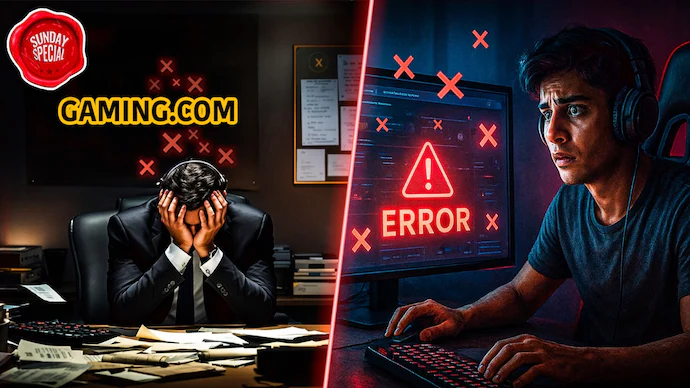🎮 Government’s : A Double-Edged Sword ⚖️
Introduction 📝
In recent years, the popularity of online gaming has skyrocketed 🚀. From kids playing battle royale games to adults enjoying strategy games, the virtual gaming world has become an integral part of modern entertainment 🕹️. However, governments across the globe – including in countries like India, China, and others – have started imposing bans or restrictions on certain types of online games 🚫.
These bans raise a serious debate: Are such measures necessary to protect society, or are they suppressing digital freedom? 🤔
Why Governments Are Banning Online Games ❓
Governments cite multiple reasons for banning or regulating online games. Let’s explore the most common ones:
1. Addiction Among Youth 👦📱
One of the major reasons is addiction. Many online games are designed to be highly engaging, using reward systems that keep players hooked for hours. This has led to:
-
Poor academic performance 📉
-
Lack of physical activity 🛋️
-
Sleep disorders 😴
-
Behavioral issues and aggression 😡
Countries like China have even imposed time limits on minors, restricting them to just 3 hours of gaming per week. 🇨🇳
2. Financial Exploitation 💸
Online games, especially those with in-app purchases, can encourage players to spend real money to gain advantages. This is particularly harmful to children who may not understand the value of money and could misuse their parents’ credit cards.
3. Cyberbullying and Harassment 🌐🚨
Multiplayer games often involve live interactions. Unfortunately, this also opens doors to cyberbullying, verbal abuse, and inappropriate behavior. This can affect a person’s mental health significantly.
4. Promotion of Violence 🔫
Some governments argue that games with violent content may desensitize young minds or encourage aggressive behavior. While research is still ongoing, the concern is valid enough for policymakers to take preventive steps.

Countries That Have Banned or Regulated Online Gaming 🌍
Here are some notable examples:
-
India 🇮🇳: Various states have banned games like PUBG, Free Fire, and online betting apps citing addiction and suicide cases. The government also introduced a framework in 2023 to regulate online real money gaming.
-
China 🇨🇳: Imposed strict time limits and requires all gamers to use their real names for identification.
-
Nepal 🇳🇵: Temporarily banned PUBG, calling it harmful to children and teenagers.
-
Iraq 🇮🇶 and Jordan 🇯🇴: Banned popular battle royale games due to concerns over mental health.
Pros of the Ban ✅
While bans may seem harsh, they do offer some benefits:
1. Protecting Mental Health 🧠
Limiting exposure to addictive games can help reduce stress, anxiety, and depression among young people.
2. Encouraging Outdoor Activities 🏃🌳
Without easy access to online games, children might return to physical sports and outdoor play.
3. Academic Improvement 📚
Students distracted by online games often perform poorly. A ban can help them focus on their studies.
4. Family Time and Real-Life Interaction 👨👩👧👦
Less time online means more time with family and friends in the real world.
Cons of the Ban ❌
Despite good intentions, gaming bans can also create problems:
1. Violation of Digital Rights 🧑⚖️💻
Many argue that such bans infringe on personal freedom and the right to choose entertainment.
2. Impact on Esports Industry 💼🎮
Gaming is not just for fun—it’s a profession for many. Esports athletes, streamers, and developers may suffer due to restrictions.
3. Job Loss and Economic Setback 📉
The gaming industry contributes significantly to the economy. Bans can lead to job losses in game development, marketing, and related sectors.
4. Black Market and VPN Use 🕵️♂️🌐
When banned officially, people often find illegal ways to access games through VPNs or pirated versions—creating security risks and legal loopholes.
The Middle Path: Regulation Over Ban ⚖️🧭
Rather than full bans, experts suggest a balanced approach that includes:
🛡️ Age Verification Systems
Only allow adults or mature players to access certain games.
🧍♂️ Parental Controls
Let parents decide what their children can access and for how long.
⏳ Time Restrictions
Implement mandatory breaks or daily limits within the games themselves.
🎓 Digital Literacy Programs
Educate kids and parents about the safe and healthy use of online games.
🤝 Collaboration with Developers
Governments can work with gaming companies to create content that is safe, non-addictive, and socially responsible.
Conclusion 🎯
The online gaming ban is a controversial issue with strong arguments on both sides. On one hand, it aims to protect the youth from addiction, violence, and financial traps 🛡️. On the other, it risks overreach, potentially stifling creativity, professional gaming careers, and personal freedom 🔒.
A blanket ban may not be the best solution. Instead, smart regulation, responsible parenting, and better game design can together create a safer and healthier gaming environment for everyone 🎮💡.
After all, technology is neither good nor bad—it’s how we use it that defines its impact on our lives 🌐❤️.
🎙️ What Do You Think?
Should the government have the power to ban online games completely, or should players be responsible for their own choices? 🗣️💬
Share your thoughts and join the debate! ⚔️
